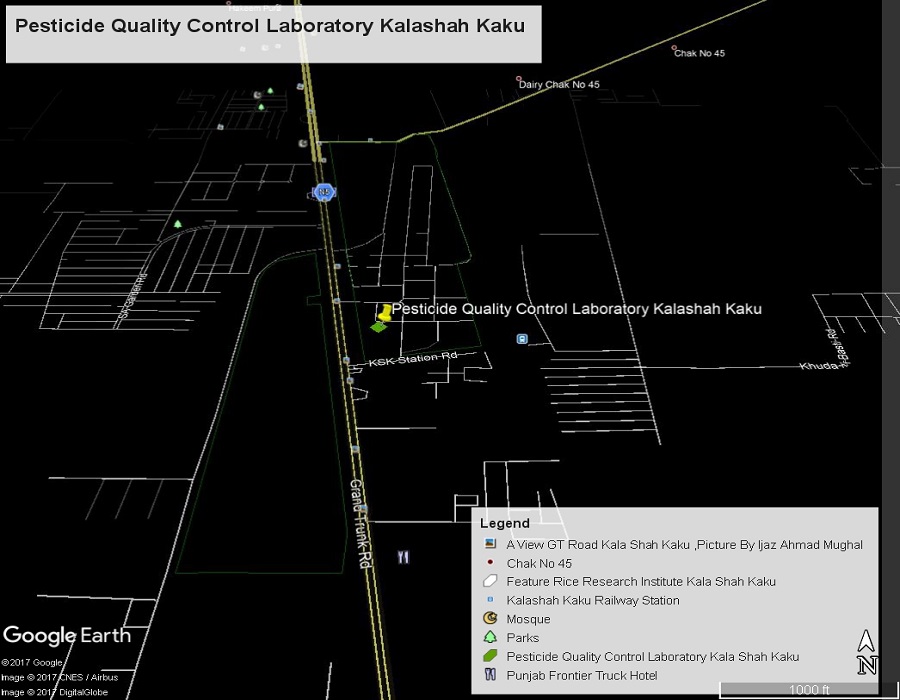Use of pesticides in the country has been increased tremendously in the last decade. The consumption of pesticide in Punjab is more than 75% of the total consumption in the country, which has gone up to about 80 thousand metric tons annually. The carryover of pesticide in food crops, fruit and vegetables has emerged as life threatening issue due to injudicious use of pesticides. No pertinent data is available on the current situation of our natural resources and food contamination because no institution/organization at the provincial level is working on the researchable issue of pesticide residue effect. Pesticide residue study is a necessary part of information for achieving adequate risk assessment that is concerned primarily with human safety. For this reason studies of pesticide residue are centered round food crops and residue in food stuffs around the Punjab. Pesticide Residue assessment from all the commodities across the Punjab is necessary for the healthy food chain and the safe Environment. Pesticide residues have been detected in fruit, vegetables and cereals. The levels of these residues in foods are often stipulated by regulatory bodies in many countries. Government of Punjab also intends to address this very issue of food safety. Pesticide Residue Laboratory, Kala Shah Kaku, is the only laboratory in the provincial setup working on this very significant issue of food safety.
Mission
The entire team of Pesticide Residue Laboratory, Kala Shah Kaku (PRL-KSK) is fully committed to maintain quality of laboratory services and ensure that its services fully meet the requirements of customers at all time. The PRL-KSK is identifying customer requirements regarding Food Safety issue and ensuring that the correct procedures are followed to meet those requirements and is always ready to take suggestions/complaints/feedbacks, as opportunity for continual improvement of system.
Objectives
- To assess pesticide residues in food, fruit, vegetables and other agricultural commodities
- To provide pesticide residue assessment service to meet the WTO and international quality standards
- To study the biodegradation of pesticides in soil and water
- Market survey to monitor the pesticide residues in fruits, vegetables and other commodities
- To determine the withholding period for different pesticides in crops, fruit and vegetable
Future Plan
- Strengthening the laboratory, for extension in state-of-the-art analysis facilities, regarding exporters’ needs in modern international markets.
- Scope enhancement of the laboratory under ISO-17025.
- Going to be a part of National Data Base activity on pesticide residues in collaboration with Federal Govt.
- To provide advanced analytical service & consultancy to help exporters of major agriculture commodities to combat the technical barrier regarding pesticide residues, under open markets & WTO scenario.
- Judicious use of agricultural chemicals, due to awareness among farmers about their potential danger towards consumers and the environment.
- Improvement of exports’ quality and quantity as a result of dissemination of information regarding MRLs of various pesticides and translating to the exporters the threat their shipments would be facing in modern international markets.
- Income generation and alleviation of ill name of the country by exporting commodities without residues or with residues well within the MRLs of the importing country(s).
Research Activities
- Basket market survey for the evaluation of pesticide residues in fruits, vegetables and cereals. A way towards establishment of MRLs of various agriculture chemicals for Pakistan.
- Controlled pesticide residual studies on keeping in view the results of basket market survey.
- Analysis of pesticide residues from advisory samples.
Completed Research Activities
- Across the Punjab, a total of 5% samples were detected with pesticide residues above the maximum residual limits (MRLs), during year 2018-19.
- A comparison was worked out, across the Punjab and more contamination of pesticide residues was observed in samples collected from the markets (22%), as compared to those collected directly from the farmer fields (16%).
- In a laboratory study during year 2016-17, it was found that after cooking process, pesticide residues of 79% vegetable samples reduced below the MRLs.
- Results of about hundred (100) concluded trials on various fruit, vegetables and cereals, showed that in most of the cases no residues were detected against the recommended application dose and application timing. It is, therefore, recommended that the Pesticide
- Label guidelines, for suitable application rate and/or the pre-harvest interval, should be strictly followed to avoid the likeliness of their residues in food.
- Dissemination of findings done through participation in various conferences, seminars as well as farmer gatherings. Three publications accomplished during the previous year 2017-18.

